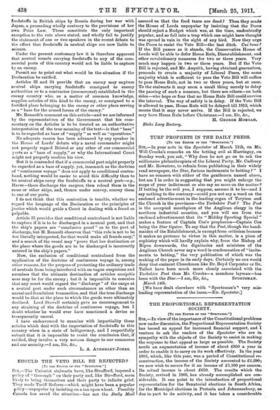SHOULD THE VETO BILL BE REJECTED? [To THE EDITOR OP
THE " SPECTATOR."]
SIR,—The Unionist stalwarts have, like Strafford, imposed a policy of " thorough" on their party and, like Strafford, seem likely to bring themselves and their party to infinite grief. They made Tariff Reform—which might have been a popular Policy—unpopular by insisting on a tax upon wheat. Possibly Canada has saved the situation—has not the Daily Mail assured us that the food taxes are dead P Then they made the House of Lords unpopular by insisting that the Peers should reject a Budget which was, at the time, undoubtedly popular, and so fall into a trap which one might have thought was spread in vain in the sight of any bird. Now they urge the Peers to resist the Veto Bill—the last ditch. Cul bono ? If the Bill passes as it stands, the Conservative House of Lords will be able to defer Home Rule, Disestablishment, and other revolutionary measures for two or three years. Very much may happen in two or three years. But if the Veto Bill is rejected, and Mr. Asquith, having obtained guarantees, proceeds to create a majority of Liberal Peers, the same majority which is sufficient to pass the Veto Bill will suffice to pass Home Rule, not in two or three years, but at once. To the stalwarts it may seem a small thing merely to delay the passing of such a measure, but there are others—on both sides—who hope or fear that no Home Rule Bill could survive the interval. The way of safety is in delay. If the Veto Bill is allowed to pass, Home Rule will be delayed till 1913, which means that it may never arrive. If the Bill is rejected, we may have Home Rule before Christmas.—I am, Sir, &c.,










































 Previous page
Previous page